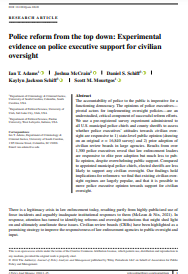Police reform from the top down: Experimental evidence on police executive support for civilian oversight
By Ian T. Adams, Joshua McCrain, Daniel S. Schiff, Kaylyn Jackson Schiff, Scott M. Mourtgos
The accountability of police to the public is imperative for a functioning democracy. The opinions of police executives—pivotal actors for implementing oversight policies—are an understudied, critical component of successful reform efforts.We use a pre-registered survey experiment administered to all U.S. municipal police chiefs and county sheriffs to assess whether police executives’ attitudes towards civilian oversight are responsive to 1) state-level public opinion (drawing on an original n = 16,840 survey) and 2) prior adoption of civilian review boards in large agencies. Results from over 1,300 police executives reveal that law enforcement leaders are responsive to elite peer adoption but much less to public opinion, despite overwhelming public support. Comparedto appointed municipal police chiefs, elected sheriffs are less likely to support any civilian oversight. Our findings hold implications for reformers: we find that existing civilian oversight regimes are largely popular, and that it is possible to move police executive opinion towards support for civilian oversight. There is a legitimacy crisis in law enforcement today, resulting partly from highly-publicized use of force incidents and arguably inadequate institutional responses to them (McLean & Nix, 2021). In Response, attention has turned to identifying reforms and oversight institutions that might shed light on and ultimately ameliorate these issues. Civilian review boards (CRBs) have been highlighted as a promising strategy to improve the responsiveness of law enforcement agencies to public oversight and input.
.J Policy Anal Manage. 2024;1–25.


